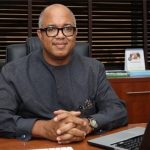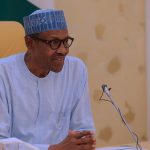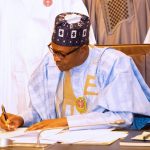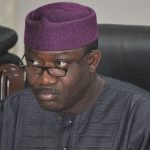OPINION: The Role of PMB Administration in The Containment Of COVID-19
Articles/Opinion, Featured, Featured Contributors/Columnists, Latest Headlines Wednesday, May 6th, 2020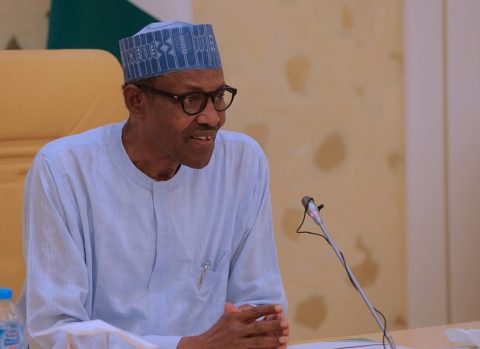
By Jide Ayobolu
(AFRICAN EXAMINER) – The first case of COVID-19 was confirmed in Nigeria on the 27th of February 2020. When the lockdown was announced by President Muhammadu Buhari on the 27th of March, there were 65 confirmed cases in the country, but today, we have confirmed over 2000 cases. With the US recording over 60,000 deaths, and Italy, Spain and the UK each recording between 25,000 and 30,000 deaths. The worst fears of Nigerians about the coronavirus disease (COVID-19) have not yet come to pass essentially because the country has so far been spared an exponential increase in COVID-19 case numbers. However, Nigeria may be treading on thin ice with the recent relaxation of the lockdown restrictions by the Federal government and inadequate awareness campaign as many Nigerians especially the uneducated who still believe the disease was either a ruse or too far from them.
On the 26th of April 2020, President Mohammadu Buhari announced measures expected to gradually ease the effects of the COVID-19 pandemic on the country. Part of the measures included extension of the 4-week lockdown on Lagos and Ogun states and the Federal Capital Territory, FCT, by one week, as well as lifting of the lockdown restrictions and the introduction of a nationwide curfew from 8pm to 6am daily as from Monday 4th of May. “I have approved a phased and gradual easing of lockdown measures,” the President announced in an evening nationwide broadcast in which plans for the start of a return towards normalcy in Lagos, the FCT and Ogun state were outlined. There was an immediate two-week lockdown in Kano following a spate of mysterious deaths. According to Buhari, the stay-at-home order imposed on March 30 came at a “very heavy economic cost,” as ordinary Nigerians, millions relying on daily wages to survive, have been left without enough money to eat. “No country can afford the full impact of a sustained lockdown while awaiting the development of vaccines,” he said. Beginning on May 4, a dusk-to-dawn curfew would remain and anyone out during the day will be required to don a face mask.”
On March 7th, 2020, the World Health Organisation (WHO) has declared COVID-19 (Coronavirus) outbreak a pandemic. The News Agency of Nigeria (NAN) reports that pandemic is an epidemic of disease that has spread across a large region; for instance multiple continents, or worldwide. Dr Tedros Ghebreyesus, WHO Director-General, during a media briefing on Wednesday, said that WHO has been assessing the outbreak and was deeply concerned both by the alarming levels of spread, severity, and levels of inaction. “Pandemic is not a word to use lightly or carelessly. It is a word that, if misused, can cause unreasonable fear, or unjustified acceptance that the fight is over, leading to unnecessary suffering and death. “Describing the situation as a pandemic does not change WHO’s assessment of the threat posed by this coronavirus. It doesn’t change what WHO is doing, and it doesn’t change what countries should do. “We have never before seen a pandemic sparked by a coronavirus. “And we have never before seen a pandemic that can be controlled at the same time,” he said. According to him, WHO has been in full response mode since it was notified of the first cases, and have called every day for countries to take urgent and aggressive action.
Dr Tedros Ghebreyesus, WHO Director-General, at a media briefing recently, said the organisation had discovered that though older people were the hardest hit, younger people were, however, not spared from the virus. “Today, I have a message for young people; you are not invincible. This Coronavirus could put you in hospital for weeks, or even kill you. “Even if you don’t get sick, the choices you make about where you go could be the difference between life and death for someone else. “I’m grateful that so many young people are spreading the word and not the virus. “Solidarity is the key to defeating COVID-19, solidarity among countries, but also between age groups. Thank you for heeding our call for solidarity,” Ghebreyesus said. He noted that daily, COVID-19 seems to reach a new and tragic milestone, saying more than 210,000 cases have now been reported to WHO, and more than 9,000 people have lost their lives.
The World Health Organisation (WHO) have warned that some countries have not taken the COVID-19 epidemic seriously, saying their level of political commitment and actions is not commensurate to the level of the threat faced globally. Dr Tedros Ghebreyesus, Director-General of WHO, said this during the daily media briefing on COVID-19. Ghebreyesus stressed that the epidemic was a threat for every country, rich or poor, adding that even high-income countries should expect surprises. “The solution is aggressive preparedness,” he said. According to him, countries have been planning for scenarios like this for decades, saying now is the time to act on those plans. “These are plans that start with leadership from the top, coordinating every part of government, not just the health ministry – security, diplomacy, finance, commerce, transport, trade, information and more – the whole government should be involved.
“Activate your emergency plans through that whole-government approach. “Educate your public, so that people know what the symptoms are and know how to protect themselves and others. “Increase your testing capacity; get your hospitals ready; ensure essential supplies are available. “Train your health workers to identify cases, provide careful and compassionate treatment, and protect themselves from infection,” he said. He emphasised that if countries act aggressively to find, isolate and treat cases, to trace every contact, they can change the trajectory of the epidemic. “If we take the approach that there is nothing we can do, that will quickly become a self-fulfilling prophecy. It is in our hands,” he said. Ghebreyesus said that WHO has published a step-by-step guidelines for countries to develop their national action plans according to eight key areas, which are supported by detailed technical guidance. “We call on all countries to accelerate those plans, and we stand ready to work with them to do that. “More funding is being made available to support countries that need it, and that have plans in place,” he said. He noted that the World Bank and the International Monetary Fund have both made funds available to stabilise health systems and mitigate the economic consequences of the epidemic.
According to him, the fund has a special focus on enabling access to critical supplies and equipment, and available to countries who need it, in line with WHO’s Strategic Preparedness and Response Plan. “These funds are essential for supporting the response now, but also for long-term preparedness,” he said. Ghebreyesus said that people’s fear about the virus could be managed and moderated with accurate information, saying WHO has launched a new social media campaign called ‘Be Ready for COVID-19’, which urges people to be safe, smart and informed. “Ultimately, how deadly this virus will be depends not only on the virus itself, but on how we respond to it. This is a serious disease. It is not deadly to most people, but it can kill. “We are all responsible for reducing our own risk of infection, and if we are infected, for reducing our risk of infecting others. “There is something all of us can do to protect vulnerable people in our communities. That is why we keep talking about solidarity. “This is not just a threat for individual people, or individual countries. We are all in this together, and we can only save lives together,” he said.
President Muhammadu Buhari has been applauded for the way he has transparently conducted the anti-Covid war by foreign bodies and other stakeholders. But, he will receive more praises only when the curve begins to flatten. The World Health Organisation (WHO) Director-General, Dr Tedros Ghebreyesus, observed that measures so far taken by Nigerians were in the right direction and result-oriented. Ghebreyesus noted that Nigeria was swift and transparent in information dissemination, thanking the Nigeria Centre For Disease Control (NCDC) for its efforts since the index case of the virus was reported in February. He said: “This a true act of solidarity and an important step in stopping the coronavirus from spreading further.”
Also, the United Nations Secretary-General, Antonio Guterres, showered encomiums on the Nigerian government for its commitment to the global war. Guterres, who spoke in New York, said Nigeria, a ‘developing country’, has “shown a remarkable capacity to respond to the coronavirus.” He added: “I have to say that some of these developing countries have shown a remarkable capacity to respond. I was quite impressed to see, for instance, Nigeria putting in place immediately in a stadium and a hospital. And I saw difficulties in countries that are much more developed to do quickly the same”. With 2,388 confirmed cases, 385 discharged and 85 deaths as at May 2, many believed that the Nigerian government has performed creditably in its fight against the pandemic. They are also of the opinion that the Presidential Task Force on COVID-19, a 12-member task force established by President Buhari, chaired by the Secretary to the Government of the Federation (SGF), Boss Mustapha, has marshaled out the agenda of the government in tackling the pandemic.
Announcing the composition of the Task Force, Garba Shehu, Senior Special Assistant (SSA) to the President on Media and Publicity, said: “Given the current global outbreak of the novel Coronavirus and its potential of causing significant disruption to health services in the country as well as impacting negatively on the economy, President Buhari has established a Presidential Task Force for the Control of the Coronavirus-19 Disease (COVID-19).” Dr Sani Aliyu was named national coordinator of the committee. Other members are the Minister of Health, Prof Osagie Ehanire; Minister of Interior, Chief Rauf Aregbesola; Minister of Aviation, Hadi Sirika; Minister of Humanitarian Affairs, Disaster Management and Social Services, Sadiya Umar-Farouk; Minister of Education, Adamu Adamu; Minister of Environment, Mohammed Mahmoud; Director-general, Department of State Services (DSS), Yusuf Bichi; Director-General, Nigeria Centre for Disease Control (NCDC); Dr Chikwe Ihekweazu; and World Health Organisation Country Representative.
Explaining the objective of the committee, Shehu said: “This action is in preparation for the unlikely but probable major outbreak of the disease in the country which will require a multi-sectoral inter-governmental approach as advised by the World Health Organisation similar to that adopted for the HIV epidemic in the last two decades.” The committee was given a mandate of six months to deliver on the assignment. It has left no stone unturned to achieve the goal through advocacy, education and enlightment programmes across the 774-local governments, the restriction of entry into the country for travellers from China, Italy, Iran, South Korea, Spain, Japan, France, Germany, United States, Norway, United Kingdom, Netherlands and Switzerland, which had are over 1,000 cases domestically at that time, and restrictions on the issuance of visas from the countries and suspension on issuance of visa on arrival.
With donations from the public and private sectors towards the fight against the pandemic, Mustapha said the Task Force, in the spirit of accountability, will publish full details of funds remitted and disbursed from the relief account. Mustapha said that an agreed arrangement with the Accountant -General of the Federation has been reached on the subject matter, adding that to ensure transparency, the task force will not be directly involved in the collection and disbursement of the cash donations.
He said: “The Accountant General of the Federation has already published the account details for collection through some commercial banks and also provided the modalities for its utilisation. All the main COVID-19 accounts shall be domiciled in the Central Bank of Nigeria”. “However, all non-cash donations shall be duly received by the PTF, acknowledged, documented and appropriately deployed,” he said.
On the role of the National Assembly, Mustapha said there is a need for the lawmakers to “develop a legislative framework to prepare Nigeria for any future pandemic, develop a legislative framework for reforming and transforming Nigeria’s healthcare systems, strengthen the legislative framework for economic growth through domestic manufacturing, deepen the legislative oversight during this pandemic and beyond, pass legislations that will further ease the ability of the executive to cushion the impact of the economic decline and be part of community mobilization and enlightenment efforts.”
On the non-compliance by private medical facilities with the directive to seek accreditation before treating COVID-19 related cases, he said the highly infectious nature of COVID-19, if not well managed by specialists, pose danger to the medical staff in such hospitals, patients and their loved ones. He urged the operators of private medical facilities wishing to treat COVID-19 cases to apply to the Federal Ministry of Health urgently, for accreditation. While re-emphasising the import of social distancing, the SGF said private hospitals are to be cleared by the relevant authorities before they can carry out treatment.
The Boss Mustapha-led task force won public admiration, owing to its sincerity when it apologised over the violation of guidelines during the burial of the late Chief of Staff to the President, Abba Kyari. Many people who were uninvited turned out for the burial, thus violating social distancing. “The PTF recognises, regrettably, the unintentional violation of the principles and protocols that form the core of our message to Nigerians at the funeral of the late chief of staff. These principles, for emphasis, include the guidance provided on mass gatherings, social distancing, personal hygiene, and restriction of movement. Lessons have been learnt and appropriate measures have been taken to close all gaps” a remorseful Mustapha said during one of the briefings of the Task Force.
Senate President Ahmad Lawan, has also applauded members of the Presidential Task Force (PTF) for their efforts in the management of the outbreak of Coronavirus. He said: “I want to commend you for the work you have been doing. I want to also take this opportunity to commend the Nigerian medical personnel” Lawan said. Foremost legal scholar Prof. Itse Sagay (SAN), Chairman of the Presidential Advisory Committee Against Corruption (PACAC), said the committee has done a great job, given the enormous challenges Nigeria is facing. He said: “I must confess that I am very impressed with the performance of all our officials, especially the Presidential Task Force on COVID-19 during this pandemic. They have really done a great job in view of the challenges that we have”. “One, we have scarce resources, not only in materials and equipment but even in trained manpower. They have established a disciplined and organised manner for dealing with the problem”. ” They have also made a lot of sacrifice in daily planning and working to help us determine what the next step should be and also advising the President on what steps he should take in fighting the virus. I think they’ve done very well so far. I’m really impressed” testing kits, treatment centres, and reduction in community transmission.
There is no doubt whatsoever that the Buhari administration has tried at great lengths to contain the spread of the COVID 19 pandemic, if not for the strategic planning and pragmatic implementation of the set objectives with sync with other tiers of government as well as inter-governmental cooperation the merciless pandemic would have wrecked unprecedented havoc in the polity.
Related Posts
Short URL: https://www.africanexaminer.com/?p=51740




